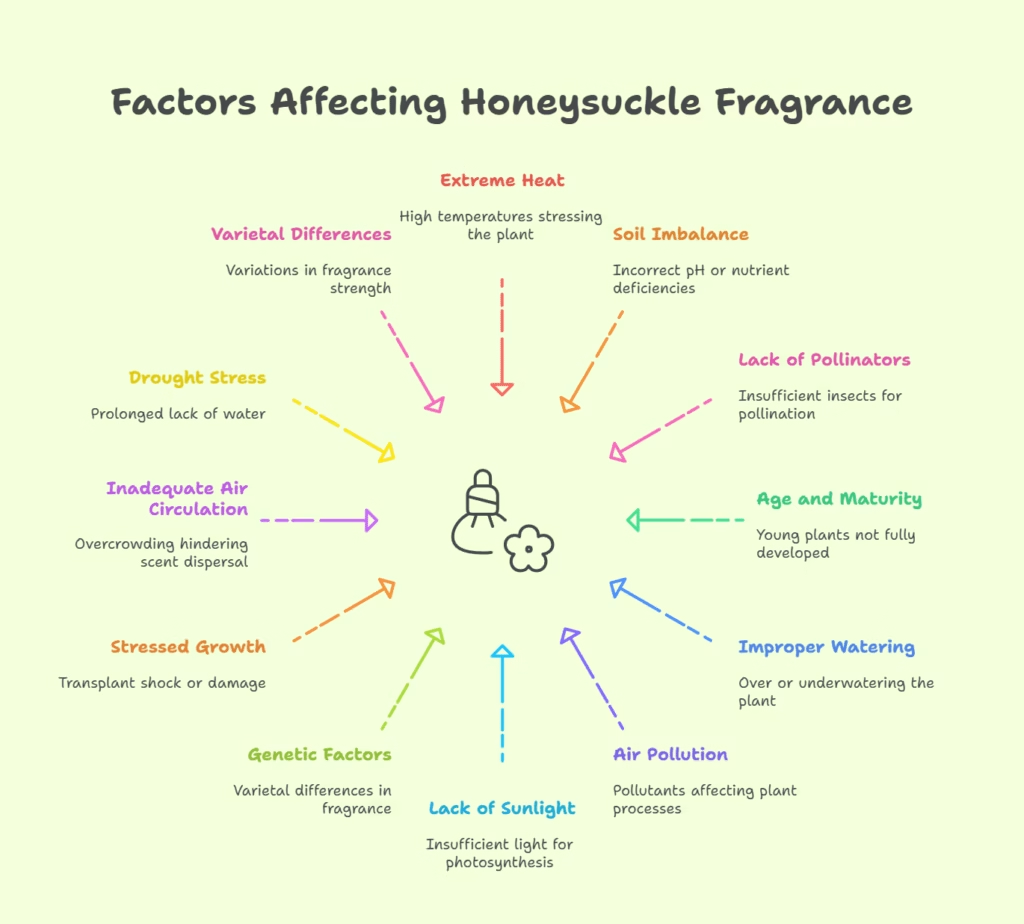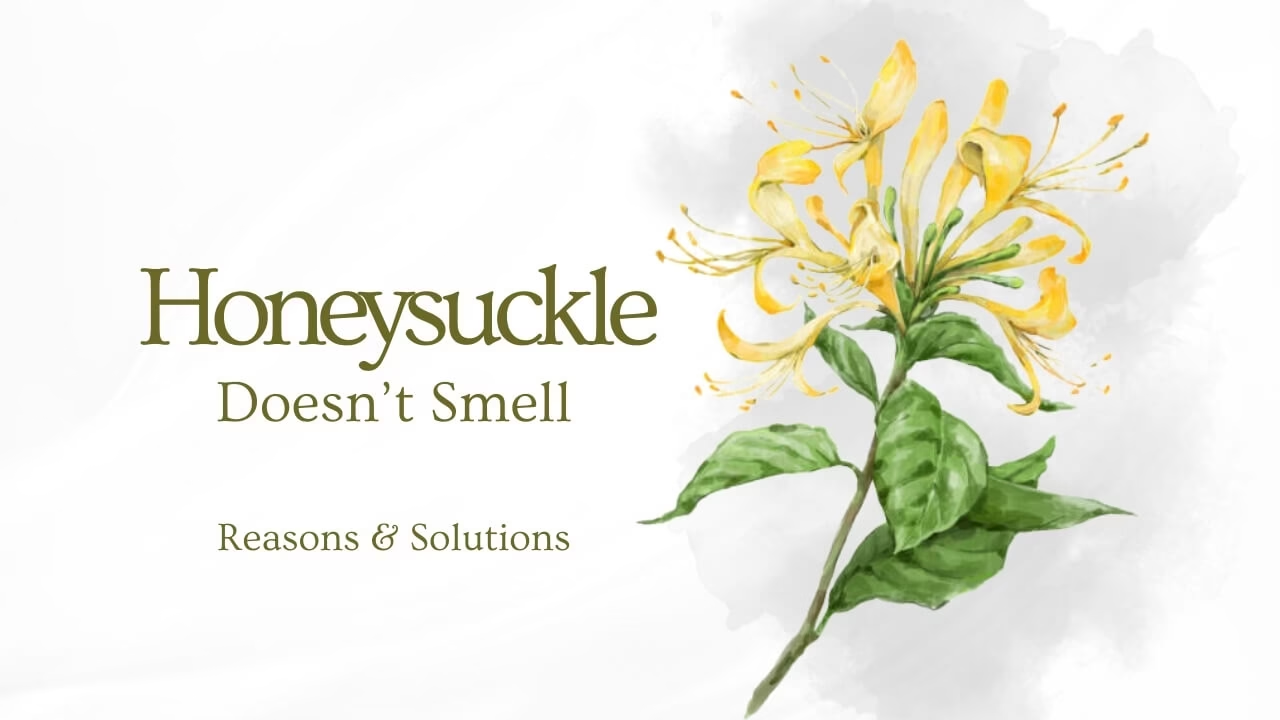I was very excited when my honeysuckle started to bloom a few days ago. But it had no smell. So I was worried about why doesn’t my honeysuckle smell.
But one thing I certainly discovered that made me tense. I couldn’t understand why doesn’t my honeysuckle smell.
I found out that excess heat, fewer pollinators, pH levels, genetic factors, improper watering, etc., are some of the reasons for it. Let’s get into the details of the reasons and what to do.
Why Honeysuckle Smell Matters in Your Garden
The fragrance of honeysuckle does more than just please your senses; it plays a meaningful role in your garden’s health and atmosphere. A sweet-smelling honeysuckle can transform outdoor spaces into relaxing, inviting areas perfect for evening strolls or quiet moments.
But beyond beauty, the scent helps attract helpful pollinators like bees, butterflies, and hummingbirds. These visitors are essential for a thriving garden, supporting both plant growth and flower production. When your honeysuckle smells strong and fresh, it’s often a sign of a healthy plant and a well-balanced environment.
That’s why understanding what affects the fragrance and how to maintain it can make a real difference in your garden’s overall success. Whether you’re growing honeysuckle along a fence, trellis, or archway, its scent can add charm and natural value to your space.
Why Is My Honeysuckle Not Smelling?
Here are reasons why your honeysuckle might not be producing a fragrance:
Extreme Heat
High temperatures can stress the plant and reduce its ability to produce a strong fragrance. Providing some shade during the hottest parts of the day can help alleviate this stress.
Soil pH and Nutrient Imbalance
Incorrect soil pH or nutrient deficiencies can impact the plant’s overall health and its ability to produce a strong fragrance. Test the soil pH and provide appropriate fertilization to ensure a balanced nutrient supply.
Lack of Pollinators
Some honeysuckle species rely on pollinators to trigger full fragrance production. If pollinators are scarce in your area, the plant might not release its scent as strongly.
Age and Maturity
Young honeysuckle plants might not produce as strong a fragrance as mature ones. Also, you should give the plant time to establish itself and reach its optimal fragrance potential.
Improper Watering
Overwatering or underwatering can stress the plant and affect its fragrance. So, you must ensure a consistent watering schedule, allowing the soil to slightly dry between waterings.
Air Pollution
Honeysuckles growing in areas with high levels of air pollution might not emit a strong fragrance due to the impact of pollutants on their physiological processes.
Lack of Sunlight
Honeysuckles require adequate sunlight to thrive and produce a strong scent. If the plant is in a shady spot, it might not develop its full aromatic potential.
Genetic Factors
Not all honeysuckle varieties are equally fragrant. Some varieties have been bred for their flowers rather than their scent, resulting in less pronounced fragrances.
Stressed Growth Conditions
Any type of stress, such as transplant shock, damage, or inconsistent care, can affect the plant’s ability to produce a strong fragrance.
Inadequate Air Circulation
Proper air circulation is essential for the fragrance to disperse effectively. If the plant is overcrowded by other vegetation, its scent might not be as noticeable.
Drought Stress
Periods of prolonged drought can cause the plant to conserve energy, reducing its fragrance production.
Varietal Differences
Even among scented honeysuckle varieties, there can be differences in fragrance strength and when the scent is most pronounced (e.g., evenings, mornings).
Plants are sensitive to their environment, and it might take a combination of adjustments to see a change in your honeysuckle’s fragrance production. Monitoring and experimenting with different care approaches can help you uncover the specific reasons behind the lack of scent.

When to Expect Honeysuckle to Smell the Strongest
The aroma of honeysuckle isn’t constant throughout the day or year; it changes based on time, temperature, and bloom stage. Knowing when honeysuckle produces its strongest fragrance can help you enjoy your garden more and understand your plant’s natural rhythm.
Morning vs Evening Honeysuckle Scent Release
Many fragrant honeysuckle varieties, especially climbing types, release their strongest scent in the early evening. As temperatures cool and humidity rises slightly, the plant emits more of its sweet, citrusy aroma.
Morning hours may carry a lighter scent, especially after a warm night. If you’re planting honeysuckle for fragrance, place it near seating areas or windows to enjoy its evening perfume.
Seasonal Honeysuckle Fragrance Patterns
Honeysuckle’s fragrance peaks during its blooming season, typically late spring through summer, depending on your region. During this time, the blossoms open more fully, and the sweet scent intensifies.
Some evergreen or repeat-blooming varieties may produce a light fragrance into early fall. Keep in mind that consistent watering, proper pruning, and full sun exposure are key to sustaining a strong scent throughout the season.
What Does Honeysuckle Smell Like?
The scent of honeysuckle is a captivating blend of sweetness and floral allure. Often described as a harmonious fusion of honey and citrus notes, the fragrance is delicate and invigorating.
This aroma carries a nostalgic charm, evoking memories of warm summer evenings and gardens in full bloom. Honeysuckle’s fragrance is potent and enchanting, capable of perfuming the air with its intoxicating presence.
The sweetness and complexity of its scent make it a favorite among nature enthusiasts and garden lovers. Moreover, it adds a touch of magic to outdoor spaces and creates a sensory experience that lingers in the mind long after the blossoms have faded.
Are you confused about which fertilizer media will be the best for your garden? Check out the Black Kow vs miracle grow compost comparison article.
Reasons and Solutions: At a Glance
Here’s a summarized table of reasons your honeysuckle might not be emitting a fragrance and the corresponding solutions:
| Reasons | Solutions |
| Insufficient sunlight | Ensure the plant receives at least 6 hours of sunlight daily. |
| Inadequate water | Maintain consistent watering, keeping the soil evenly moist. |
| Poor soil conditions | Improve soil quality with compost and proper pH balance. |
| Pruning issues | Prune after flowering and avoid excessive pruning. |
| Incorrect variety | Confirm you have a fragrant honeysuckle species. |
| Plant age | Be patient; young plants may take time to develop fragrance. |
| Environmental stress | Protect from extreme temperatures and environmental stress. |
| Improper fertilization | Use balanced fertilizer suitable for flowering plants. |
| Lack of pollinators | Plant companion plants to attract pollinators. |
| Soil pH and nutrient imbalance | Test soil pH and provide proper fertilization. |
| Lack of air circulation | Ensure proper spacing and ventilation around the plant. |
| Genetic factors | Some varieties are naturally less fragrant. |

What to Do If My Honeysuckle Dosen’t Smell?
If your honeysuckle isn’t producing the expected fragrance, here’s what you can do to address the issue:
Assess Environmental Conditions
- Ensure your honeysuckle is getting sufficient sunlight. Aim for at least 6 hours of direct sunlight each day.
- Check the soil moisture regularly. Honeysuckles prefer consistently moist, well-draining soil. Avoid letting the soil dry out completely between waterings.
- Verify that the soil is of good quality, enriched with compost, and has the appropriate pH for honeysuckle growth.
Pruning
- Prune your honeysuckle at the right time and in the right way. Prune after flowering to encourage new growth for the next season, but avoid excessive pruning that could remove potential flowering stems.
Plant Variety
- Confirm that you have a fragrant honeysuckle variety. Some varieties are bred for their flowers rather than fragrance.
Age and Maturity
- If your honeysuckle is young, be patient. It might take a couple of years for the plant to establish itself and produce a strong scent.
Disorder and Pests
- Inspect the plant for any signs of disease or pests. Also, you should treat any issues promptly to prevent them from affecting fragrance production.
Stress Reduction
- Protect the plant from extreme temperature changes, as stress can impact fragrance production. Provide some shade during excessively hot periods.
Fertilization
- Use a balanced fertilizer formulated for flowering plants. Also, avoid over-fertilizing, as this can lead to excessive foliage growth and fewer flowers.
Pollinator Attraction
- Encourage pollinators to visit your garden by planting companion plants that attract them. Additionally, pollinators can help trigger fragrance production.
Proper Care
- Follow proper care guidelines for honeysuckle maintenance, including watering, fertilizing, and providing proper support for climbing.
Air Circulation
- Ensure that the honeysuckle plant has adequate space and air circulation around it. Avoid overcrowding with other plants.
Mulching
- Apply a layer of mulch around the base of the plant to retain moisture, regulate soil temperature, and prevent weed growth.
Consult a Gardening Expert
- If you’ve tried various approaches and your honeysuckle still doesn’t emit fragrance, consider seeking advice from a local gardening expert or horticulturist. Besides, they can provide specific recommendations based on your plant’s environment.
You might still have doubts about why doesn’t my honeysuckle smell. Moreover, it might be an odd feature of your particular honeysuckles plant type.

Honeysuckle Maintenance Tips
Here are some concise honeysuckle maintenance tips. Check them out below:
- Sunlight: Provide at least 6 hours of direct sunlight daily for optimal growth and fragrance.
- Watering: Keep soil consistently moist but not waterlogged. Water deeply and avoid letting the soil dry out completely.
- Soil: Ensure well-draining soil enriched with compost. Check soil pH and adjust if needed.
- Pruning: Prune after flowering to encourage new growth. Avoid excessive pruning that removes potential flowering stems.
- Fertilization: Also, try to use balanced fertilizers for flowering plants. Avoid over-fertilizing, which can hinder flowering.
- Support: Provide proper support for climbing vines to encourage healthy growth and better air circulation.
- Pollinators: Plant companion plants to attract pollinators, which can enhance fragrance production.
- Air Circulation: Allow enough space around the plant for air circulation, preventing overcrowding.
- Transplanting: Minimize transplant shock by careful handling and ensuring proper post-transplant care.
- Age and Patience: Young honeysuckle plants might take time to develop strong fragrance. Be patient as they mature.
- Mulching: Apply mulch around the base to retain moisture, regulate temperature, and prevent weed growth.
- Avoid Stress: Protect from extreme temperatures and provide shade during heatwaves.
- Pruning Technique: Prune correctly, removing dead or diseased growth and shaping the honeysuckle plant as needed.
- Varietal Consideration: Choose the most fragrant honeysuckle varieties if fragrance is a priority.
- Water During Drought: Water consistently during dry periods to prevent stress.
- Soil Drainage: Ensure proper drainage to prevent root rot and other water-related issues.
- Cultural Care: Evaluate the overall care routine and adjust as needed for optimal plant health.
Remember that different honeysuckle plant varieties might have slightly different care requirements. So, you should adapt these tips to suit your specific plant and local conditions.
FAQs
Could overcrowding affect honeysuckle fragrance?
Yes, inadequate air circulation due to overcrowding can limit fragrance dispersal. Ensure proper spacing between plants and allow room for the honeysuckle to grow and emit its scent effectively.
Is nighttime fragrance different from daytime scent?
Yes, some honeysuckle perfume varieties release stronger fragrances during specific times, often evenings. Factors like temperature and pollinator activity can influence when the scent is most pronounced.
Could my honeysuckle be too old to produce fragrance?
While age can influence fragrance, older honeysuckle plants can still produce a strong scent if properly cared for. Focus on maintaining overall plant health and providing ideal growing conditions to encourage fragrance.
Are you still wondering why doesn’t my honeysuckle smell? I guess you got some answers from us here. If you also have orchids, you might find my last article helpful Reasons and solutions for bad smell in orchids.






